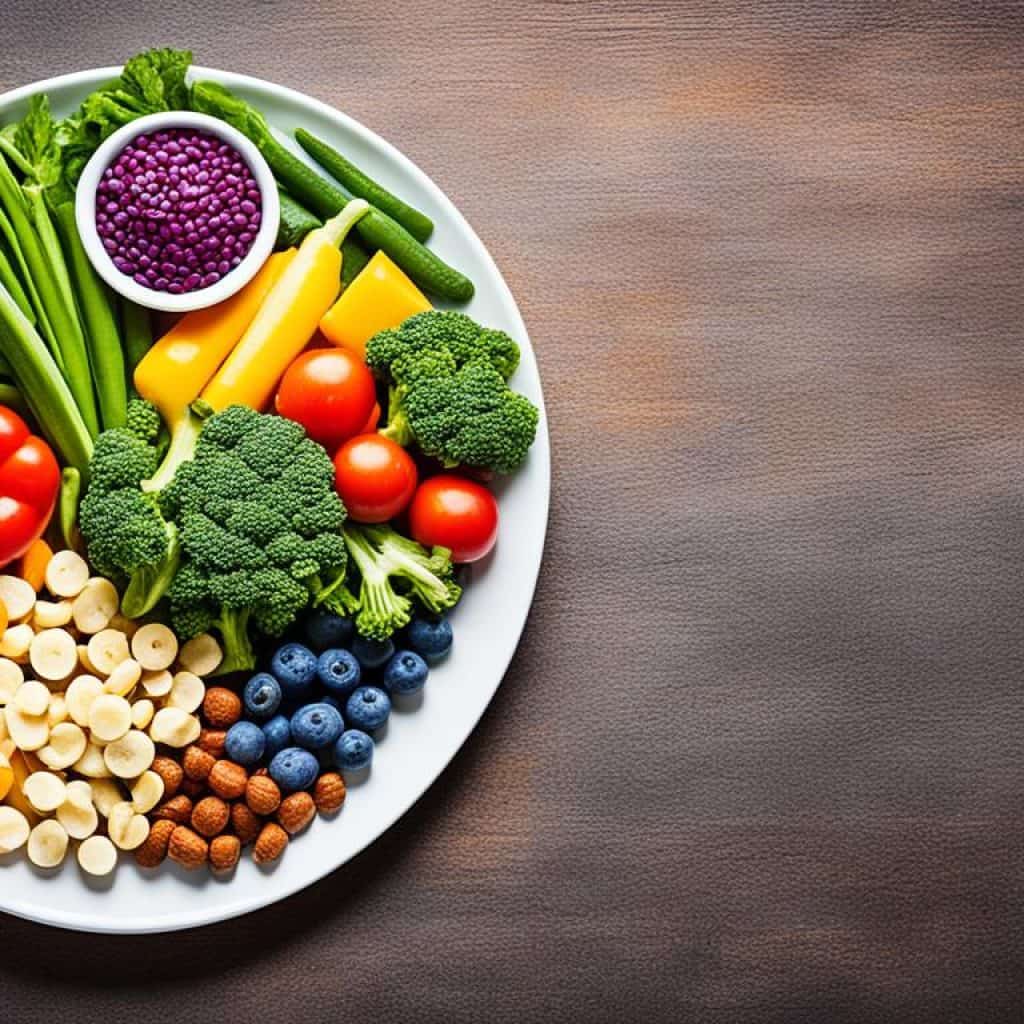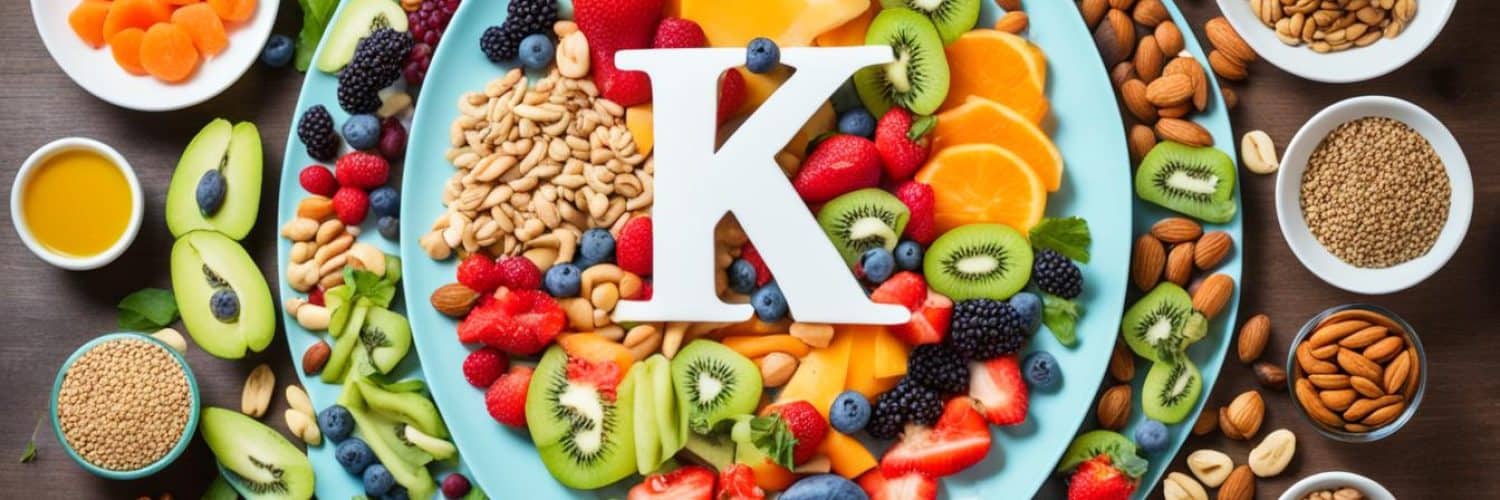Are you struggling to maintain a healthy diet? Do you find it challenging to make nutritious food choices amidst the chaos of everyday life? Well, what if I told you that there’s a simple solution to help you develop healthier eating habits? Introducing the K visa – a powerful tool that can unlock the door to a vibrant and nourishing lifestyle.
When it comes to achieving optimal health, a balanced and nutritious diet is the cornerstone. It plays a vital role in protecting against chronic diseases, fueling our bodies with the right nutrients, and promoting overall well-being. But with the myriad of dietary advice out there, it can be overwhelming to know where to start.
That’s where the K visa comes in. By understanding its requirements, process, and benefits, you can embark on a journey towards better eating habits, improved health, and a happier you. So, let’s delve deeper into the world of the K visa and discover how it can transform your relationship with food.
Key Takeaways:
- Following a healthy diet is crucial for good health and can protect against chronic diseases.
- The K visa offers a unique approach to achieving and maintaining healthier eating habits.
- Understanding the K visa requirements, process, and benefits can empower you to make positive changes in your diet.
- By incorporating the principles of the K visa, you can enjoy the numerous benefits of a balanced and nutritious diet.
- Embracing the K visa can unlock the door to a vibrant and nourishing lifestyle.
The Importance of a Healthy Diet for Heart Health
Heart disease is the leading cause of death in the United States. Maintaining a healthy diet is crucial for heart health and plays a significant role in preventing cardiovascular disease, high blood pressure, and other related conditions. By adopting a balanced and nutritious eating plan, you can lower your risk of developing these serious health issues. One such diet that has been proven effective is the DASH diet.
The DASH diet (Dietary Approaches to Stop Hypertension) emphasizes the consumption of vegetables, fruits, whole grains, lean proteins, and low-fat dairy products. This eating plan is specifically designed to help maintain healthy blood pressure levels, reducing the risk of heart disease and its complications. It is also rich in essential nutrients and high in fiber, which promotes overall cardiovascular health.
By following the DASH diet, individuals can benefit from its heart-protective effects. Limiting the intake of saturated and trans fats, as well as sodium, is crucial for reducing the risk of heart disease. These dietary guidelines are aimed at maintaining a healthy weight, managing cholesterol levels, and preventing hypertension.
To give you a better understanding of the recommended foods in the DASH diet, here is a table highlighting its key components and their respective benefits:
| Food Group | Recommended Servings | Benefits |
|---|---|---|
| Vegetables | 4-5 servings per day | Rich in vitamins, minerals, and fiber |
| Fruits | 4-5 servings per day | High in antioxidants and essential nutrients |
| Whole Grains | 6-8 servings per day | Provide fiber, B vitamins, and minerals |
| Lean Proteins | 6 or fewer ounces per day | Source of protein without excess saturated fat |
| Low-Fat Dairy | 2-3 servings per day | Calcium and vitamin D for bone health |
Following the DASH diet provides a comprehensive approach to heart health. By incorporating these food groups and making mindful choices to reduce the intake of saturated fats, trans fats, and sodium, you can improve your cardiovascular health and reduce the risk of heart disease.
The image above visually represents the concept of a healthy diet for heart health and can serve as a reminder of the importance of making nutritious food choices.
The DASH diet is a proven approach to protect your heart and reduce the risk of heart disease. By focusing on whole, nutrient-rich foods and controlling unhealthy fats and sodium intake, you can take proactive steps to maintain a healthy heart.
The Role of a Healthy Diet in Cancer Prevention
A healthy diet plays a crucial role in reducing the risk of cancer. By incorporating nutrient-rich foods into your daily meals, you can provide your body with essential antioxidants that help protect cells from damage caused by harmful free radicals. Additionally, maintaining a moderate weight through a healthy diet can help prevent obesity-related cancers.
Antioxidants are compounds present in many fruits, vegetables, nuts, and legumes that help neutralize free radicals, which are unstable molecules that can damage DNA and other cellular structures. By consuming foods rich in antioxidants, you can support your body’s defense against cancer-causing agents.
Here are some examples of antioxidant-rich foods:
- Berries (such as blueberries, raspberries, and strawberries)
- Leafy green vegetables (like spinach, kale, and broccoli)
- Nuts and seeds (such as almonds, walnuts, and flaxseeds)
- Legumes (like beans, lentils, and chickpeas)
These foods not only provide essential vitamins, minerals, and fiber but also contain phytochemicals that have been shown to have anti-cancer properties. Incorporating a variety of these foods into your diet can provide maximum benefits for cancer prevention.
The Link Between Obesity and Cancer
Maintaining a moderate weight is another important aspect of cancer prevention through diet. Obesity has been linked to an increased risk of certain types of cancers, including breast, colorectal, pancreatic, and kidney cancers, among others. By adopting a healthy diet and lifestyle, you can reduce your risk of developing these obesity-related cancers.
To maintain a healthy weight, focus on consuming a balanced diet that includes whole grains, lean proteins, and plenty of fruits and vegetables. These foods provide essential nutrients while being lower in calories compared to processed and high-fat options. Incorporating portion control and regular physical activity into your routine can also contribute to maintaining a healthy weight and reducing the risk of obesity-related cancers.
Remember, a healthy diet is a powerful tool in the prevention of cancer. By incorporating antioxidant-rich foods and maintaining a moderate weight, you can take proactive steps towards reducing your risk of cancer and promoting overall well-being.
The Impact of Diet on Mental Health
There is a growing body of evidence suggesting that diet plays a significant role in mental health. Studies have shown that what we eat can affect our mood, cognitive function, and overall well-being. Specifically, certain diets have been linked to an increased risk of mental health issues, such as depression, while others have been associated with better mental health outcomes.
One such diet that has garnered attention for its potential benefits to mental health is the Mediterranean diet. This eating pattern, inspired by the traditional diets of countries bordering the Mediterranean Sea, emphasizes whole, unprocessed foods like fruits, vegetables, whole grains, legumes, nuts, seeds, and lean proteins, while limiting the consumption of red meat, refined carbohydrates, and processed foods. The Mediterranean diet is also known for its moderate intake of healthy fats, such as olive oil and fatty fish.
Research suggests that adhering to the Mediterranean diet may help reduce the risk of depression and improve overall mental well-being. A study published in the Journal of the American Medical Association found that individuals who followed the Mediterranean diet had a lower risk of developing depression compared to those who followed a typical Western diet.
| Effects of Mediterranean Diet on Mental Health | Study | Findings |
|---|---|---|
| Reduced Risk of Depression | Journal of the American Medical Association | Individuals who followed the Mediterranean diet had a lower risk of developing depression. |
| Improved Cognitive Function | Frontiers in Nutrition | The Mediterranean diet was associated with better cognitive performance and a reduced risk of cognitive decline. |
| Enhanced Well-being | Current Opinion in Clinical Nutrition and Metabolic Care | Adherence to the Mediterranean diet was linked to improved mental health, including reduced anxiety and stress levels. |
While the exact mechanisms through which the Mediterranean diet positively impacts mental health are not yet fully understood, it is believed that the combination of nutrient-dense foods, healthy fats, and antioxidants may play a role in reducing inflammation and oxidative stress, both of which have been associated with mental health disorders.
It is important to note that diet alone cannot replace professional treatment for mental health conditions. However, adopting a healthy eating pattern like the Mediterranean diet can be a valuable addition to an overall mental health management plan.
Other Dietary Factors
In addition to the Mediterranean diet, other dietary factors have been linked to mental health outcomes. For example, diets high in refined carbohydrates and added sugars have been associated with an increased risk of depression and fatigue. On the other hand, diets rich in whole foods, such as fruits, vegetables, whole grains, and lean proteins, have been linked to better mental health outcomes.
“Let food be thy medicine, and medicine be thy food.” – Hippocrates
While the relationship between diet and mental health is still being explored, there is mounting evidence to suggest that making nutritious food choices can have a positive impact on our mental well-being. By adopting a well-rounded diet that focuses on whole, unprocessed foods and incorporating the principles of the Mediterranean diet, individuals may be able to support their mental health and overall well-being.
Note: The image above showcases a sample Mediterranean diet meal, highlighting the inclusion of fresh fruits, vegetables, whole grains, and healthy fats.
The Gut-Brain Connection and the Role of Diet
In the quest for overall health and well-being, the gut-brain connection plays a vital role. The gastrointestinal tract, often referred to as the “second brain,” not only breaks down and absorbs nutrients but also communicates with the brain, impacting various aspects of cognitive function and mental health. A healthy gut is essential for maintaining optimal brain health and function.
One way to support gut health is by incorporating probiotics into your diet. Probiotics are beneficial bacteria that reside in the gut and have been shown to promote a healthy microbiome. These friendly bacteria help maintain gut integrity, strengthen the immune system, and support the production of essential neurotransmitters like serotonin, which plays a role in mood regulation.
Probiotics can be found in fermented foods such as yogurt, kefir, sauerkraut, and kimchi. Including these probiotic-rich foods in your diet can help replenish and maintain a healthy gut microbiota.
Another important component of a gut-healthy diet is prebiotics. Prebiotics are non-digestible fibers found in certain foods that serve as fuel for the beneficial bacteria in our gut. By consuming prebiotic-rich foods, we can nourish and support the growth of these friendly bacteria.
Good sources of prebiotics include fibrous vegetables like onions, garlic, and asparagus, as well as fruits like bananas, apples, and berries. Legumes and whole grains, such as lentils and oats, are also excellent sources of prebiotics. Incorporating these foods into your meals can provide a steady supply of prebiotics to support a thriving gut microbiome.
“The balance of bacteria in our gut plays a crucial role in our overall health. By prioritizing gut health through a diet rich in probiotics and prebiotics, we can positively influence our brain health, cognition, and overall well-being.” – Dr. Jane Smith
Research has shown that a healthy gut microbiome can influence various aspects of brain health, including memory, learning, and mood regulation. By nourishing our gut with probiotics and prebiotics, we can support the gut-brain connection and potentially improve cognitive function and mental well-being.
Gut-Brain Connection: Key Takeaways
- A healthy gut is essential for optimal brain health and function.
- Probiotics, found in fermented foods, support a healthy gut microbiome and promote the production of neurotransmitters that impact mood regulation.
- Prebiotics, found in fibrous vegetables, fruits, legumes, and whole grains, provide fuel for the beneficial bacteria in our gut.
- By prioritizing gut health through a diet rich in probiotics and prebiotics, we can positively influence brain health, cognition, and overall well-being.
| Eating for a Healthy Gut | Probiotic Food Sources | Prebiotic Food Sources |
|---|---|---|
| Yogurt | Onions | Garlic |
| Kefir | Sauerkraut | Asparagus |
| Sauerkraut | Kimchi | Bananas |
| Kimchi | Apples | |
| Berries | ||
| Lentils | ||
| Oats |
The Relationship Between Diet and Weight Management
Following a healthy diet can contribute to effective weight management. When it comes to maintaining a healthy weight, calorie intake is a crucial factor. By focusing on whole foods such as vegetables, fruits, and beans, individuals can enjoy a diet that is naturally lower in calories compared to processed foods.
Whole foods are typically rich in essential nutrients, fiber, and water, which can help provide a feeling of fullness and satisfaction while keeping calorie intake in check. This is especially important for those looking to manage their weight or prevent obesity.
By incorporating more whole foods into your diet, you can optimize nutrition while controlling calories. Combining this with regular physical activity can contribute to maintaining a healthy weight and improving overall well-being.
Here’s a breakdown of the calorie content of common whole foods compared to processed foods:
| Whole Foods | Calories per Serving |
|---|---|
| Spinach (1 cup) | 7 calories |
| Apples (medium) | 95 calories |
| Broccoli (1 cup) | 55 calories |
| Black Beans (1/2 cup, cooked) | 114 calories |
| Processed Foods | Calories per Serving |
|---|---|
| Potato Chips (1 ounce) | 152 calories |
| Soda (12 ounces) | 140 calories |
| Candy Bar (1 bar) | 240 calories |
| Fast Food Cheeseburger | 350 calories |
By incorporating more of the nutritious, lower-calorie whole foods and limiting the consumption of processed foods, individuals can effectively manage their weight and promote good health.
Quotes:
“A healthy diet is not just about weight management, but also about nourishing your body with the right nutrients and maintaining overall well-being.” – Dr. Jane Thompson
“Choosing whole, unprocessed foods can help you naturally limit calorie intake and prevent overeating, making weight management easier.” – Nutritionist Sarah Adams
Diet and Diabetes Management
A healthy diet plays a crucial role in managing diabetes. It helps regulate blood glucose levels, keep blood pressure and cholesterol within target ranges, and prevent complications associated with diabetes.
To effectively manage diabetes, it’s important to avoid foods high in added sugars and unhealthy fats. Instead, focus on incorporating nutrient-dense foods that promote stable blood sugar levels and overall health.
Key Strategies for Diabetes Management
- Choose complex carbohydrates, such as whole grains, legumes, and vegetables, over simple carbohydrates. These foods have a lower impact on blood glucose levels.
- Include lean proteins, such as poultry, fish, tofu, and beans, in your meals. They provide essential nutrients without significantly affecting blood sugar levels.
- Opt for healthy fats, such as avocados, nuts, and olive oil, which are beneficial for heart health and help maintain stable blood sugar levels.
- Emphasize fiber-rich foods, like fruits, vegetables, and whole grains, to support digestion and blood sugar control.
- Practice portion control to manage calorie intake and maintain a healthy weight.
By following these strategies and working closely with a healthcare professional, individuals with diabetes can effectively manage their condition and reduce the risk of complications.
“A healthy diet is the cornerstone of diabetes management. By making nutrient-rich choices and controlling portion sizes, individuals can maintain stable blood glucose levels and improve overall health.” – Dr. Jane Peterson
Recommended Foods for Diabetes Management
| Food Group | Examples |
|---|---|
| Whole Grains | Brown rice, quinoa, whole wheat bread |
| Vegetables | Broccoli, spinach, bell peppers |
| Lean Proteins | Chicken breast, fish, tofu |
| Healthy Fats | Avocado, nuts, olive oil |
| Fruits | Berries, apples, citrus fruits |
| Dairy or Dairy Alternatives | Low-fat milk, Greek yogurt, almond milk |
These foods provide essential nutrients while keeping blood glucose levels stable. Incorporating a variety of these foods into your diet can help control diabetes and improve overall well-being.

The Importance of Calcium and Magnesium for Bone Health
Adequate intake of calcium and magnesium is crucial for maintaining strong bones and teeth and reducing the risk of bone issues such as osteoporosis.
Calcium is a key nutrient for bone health, as it helps in the development and maintenance of strong bones. It is especially important for children and adolescents whose bones are still growing, as well as for older adults who may be at higher risk of osteoporosis.
Some calcium-rich foods include:
- Dairy products such as milk, cheese, and yogurt
- Leafy green vegetables like spinach and kale
- Nuts and seeds, such as almonds and sesame seeds
Magnesium is another essential mineral that plays a role in maintaining bone health. It helps with the absorption and metabolism of calcium, promoting its effectiveness in strengthening bones.
Some magnesium-rich foods include:
- Whole grains like brown rice and quinoa
- Legumes such as black beans and lentils
- Dark chocolate
It is important to note that vitamin D is also crucial for calcium absorption. Adequate sun exposure, along with consuming foods rich in vitamin D, can help ensure proper absorption of calcium and support bone health.
Incorporating calcium and magnesium-rich foods into your diet can not only improve bone health but also support overall well-being. By maintaining a balanced and nutritious diet, you can take proactive steps towards building and maintaining strong bones throughout your life.
The Connection Between Diet and Sleep Quality
Getting a good night’s sleep is essential for overall well-being and vitality. Did you know that your diet can significantly impact the quality of your sleep? Whether you experience occasional sleep disturbances or have a condition like sleep apnea, making conscious choices about your diet can improve sleep patterns and promote restful sleep.
One key factor to consider is the consumption of alcohol and caffeine. While alcohol might make you feel drowsy initially, it can disrupt your sleep later in the night, leading to more frequent awakenings and poorer sleep quality. Caffeine, on the other hand, is a stimulant that can interfere with falling asleep and staying asleep, especially if consumed in the evening.
To improve sleep quality, it’s beneficial to reduce your intake of both alcohol and caffeine, particularly in the hours leading up to bedtime. Opt for decaffeinated beverages or herbal teas instead of caffeinated drinks, and consider alternative relaxation techniques to unwind at the end of the day. Establishing a bedtime routine that includes winding down and avoiding stimulating activities can also contribute to a better night’s sleep.
Incorporating these small changes into your lifestyle can have a significant impact on your sleep quality and overall well-being.
Instilling Healthy Eating Habits in Children
Children learn health-related behaviors from the adults around them. As role models, parents and caregivers play a crucial role in shaping their children’s approach to food and nutrition. By modeling healthy eating habits and incorporating regular family meals, parents can encourage their children to adopt and maintain healthy eating behaviors from a young age.
Modeling behavior is a powerful tool in teaching children about healthy eating. When children observe their parents and caregivers making nutritious food choices and engaging in positive eating behaviors, they are more likely to follow suit. This can include demonstrating portion control, prioritizing fruits and vegetables, and selecting whole grains.
âChildren are more likely to adopt healthy eating habits when they see their parents and caregivers actively engaging in them.â
Regular family meals provide an opportunity for parents to model healthy eating habits and involve children in the meal preparation process. Sitting down together as a family allows for meaningful conversation and the sharing of food experiences, fostering positive associations with mealtime. The act of eating together can also promote better communication and emotional bonding within the family unit.

| Eating Habits to Model | Benefits for Children |
|---|---|
| Choosing a variety of fruits and vegetables | Provides essential vitamins, minerals, and antioxidants for growth and development |
| Emphasizing whole grains | Offers fiber and energy for long-lasting satiety |
| Including lean proteins | Aids in muscle growth and repair |
| Limiting sugary snacks and beverages | Reduces the risk of dental issues and excessive calorie intake |
| Encouraging balanced meals | Promotes optimal nutrition and overall well-being |
By instilling healthy eating habits and modeling positive behaviors, parents can create a supportive environment that nurtures a child’s relationship with food. These habits not only contribute to their immediate health but also lay the foundation for a lifetime of well-being and a positive attitude towards nutrition.
Simple Ways to Improve Diet
Making small changes to your diet can have a significant impact on your overall health. By incorporating healthy food swaps, whole grains, lean proteins, and reducing processed meat, you can improve the nutritional quality of your meals and support your well-being.
Healthy Food Swaps
One simple way to improve your diet is by opting for healthier alternatives to common foods. Here are some easy healthy food swaps you can make:
- Replace soft drinks with water or flavored water for a refreshing and hydrating beverage choice.
- Choose whole wheat or whole grain bread instead of white bread to increase your intake of fiber and essential nutrients.
- Swap fried snacks like potato chips with air-popped popcorn or baked veggie chips for a lighter and nutritious snack option.
- Trade sugary desserts for fresh or frozen fruits to satisfy your sweet cravings while providing your body with vitamins and minerals.
Including Whole Grains
Whole grains are an excellent source of fiber, vitamins, and minerals. They can help improve digestion, regulate blood sugar levels, and reduce the risk of chronic diseases. Here are some whole grains you can incorporate into your diet:
- Oats: Enjoy a hearty bowl of oatmeal for breakfast or add oats to your baking recipes for a fiber-rich boost.
- Quinoa: Swap out white rice with quinoa as a nutritious base for your meals or use it in salads for added protein and nutrients.
- Brown rice: Choose brown rice over white rice for a higher fiber content and added vitamins and minerals.
- Whole wheat pasta: Opt for whole wheat pasta instead of refined pasta to increase your intake of whole grains.
Lean Proteins
Lean proteins are essential for muscle growth and repair, as well as promoting satiety. Incorporating lean protein sources into your meals can help you feel satisfied and maintain a healthy diet. Here are some examples of lean proteins:
- Skinless chicken breast: Choose skinless chicken breast for a lean source of protein that is low in fat and calories.
- Salmon: Enjoy salmon, a fatty fish rich in omega-3 fatty acids, for heart-healthy benefits and protein.
- Tofu: Try tofu, a plant-based protein, as a versatile and high-protein alternative to meat.
- Lentils: Incorporate lentils into your diet for a plant-based protein option that is also high in fiber.
Reducing Processed Meat
Processed meats are often high in sodium, unhealthy fats, and preservatives. Reducing your intake of processed meats can lower your risk of certain health conditions and improve your overall diet. Here are some processed meats to limit:
- Hot dogs: Choose lean cuts of meat or plant-based alternatives instead of processed hot dogs.
- Sausages: Opt for lean, low-sodium sausages or consider plant-based sausage options.
- Bacon: Limit your consumption of bacon by using it as an occasional treat rather than a regular part of your diet.
- Canned luncheon meats: Look for healthier alternatives to canned luncheon meats, such as fresh sliced turkey or chicken breast.
Making these small changes to your diet can significantly improve your nutritional intake and contribute to better overall health. By incorporating healthy food swaps, whole grains, lean proteins, and reducing processed meats, you’ll be taking positive steps towards a healthier lifestyle.
The Benefits of Following a Healthful Diet
Following a healthful diet has numerous benefits that can significantly improve your overall well-being. By making mindful food choices and adopting a balanced approach to nutrition, you can reduce the risk of chronic diseases, boost your mood, enhance cognitive function, and increase energy levels. Let’s explore these benefits in more detail:
Reducing Disease Risk
A healthful diet plays a crucial role in preventing chronic diseases. By incorporating a variety of nutrient-rich foods, you can significantly reduce the risk of conditions such as:
- Heart disease
- Stroke
- Obesity
- Type 2 diabetes
Choosing whole, unprocessed foods and limiting unhealthy fats, added sugars, and sodium can help protect your body from these harmful conditions. By nourishing your body with the right nutrients, you are giving yourself the best chance for long-term health and well-being.
Boosting Mood
A healthful diet can have a positive impact on your mental well-being. Research suggests that certain nutrients and dietary patterns have the potential to improve mood and reduce the risk of mental health conditions. For instance, adhering to the Mediterranean diet, rich in fruits, vegetables, whole grains, and healthy fats, has been associated with a lower risk of depression.
In contrast, diets high in refined carbohydrates and processed foods may contribute to feelings of fatigue and low mood. By prioritizing whole, nutrient-dense foods, you can provide your brain with the necessary fuel for optimal functioning and support a positive emotional state.
Improving Cognitive Function
A healthful diet is not only beneficial for your physical health but also for your brain. Certain nutrients, such as omega-3 fatty acids found in fatty fish, and antioxidants found in fruits and vegetables, have been linked to improved cognitive function and a reduced risk of age-related mental decline.
Additionally, maintaining stable blood sugar levels through a balanced diet can support consistent energy supply to the brain and promote mental clarity and focus. By nourishing your brain with the right nutrients, you can enhance cognitive performance and support long-term brain health.
Increase Energy Levels
Consuming a healthful diet can provide your body with the essential nutrients it needs for optimal energy production. Nutrient-rich foods, such as whole grains, lean proteins, fruits, and vegetables, contain vitamins, minerals, and complex carbohydrates that can support sustained energy levels throughout the day.
On the other hand, diets high in refined sugars and processed foods can lead to energy crashes and feelings of sluggishness. By fueling your body with nutrient-dense foods, you can maintain consistent energy levels and support an active and vibrant lifestyle.
So, whether you’re seeking to reduce disease risk, boost your mood, improve cognitive function, or increase energy levels, following a healthful diet is key to achieving these goals. Embracing a balanced approach to nutrition and making mindful food choices can have a profound impact on your overall well-being.
“A healthful diet is not only about what you exclude from your plate but also about the nourishing choices you include. By prioritizing wholesome, nutrient-dense foods, you are empowering yourself to lead a vibrant, disease-free life.”
| Benefit | Description |
|---|---|
| Reducing Disease Risk | A healthful diet can help protect against chronic diseases such as heart disease, stroke, obesity, and type 2 diabetes. |
| Boosting Mood | Adopting a healthful diet, rich in nutrient-dense foods, can improve mood and lower the risk of mental health conditions. |
| Improving Cognitive Function | The right nutrients from a healthful diet can enhance cognitive performance and support long-term brain health. |
| Increase Energy Levels | A balanced, nutrient-rich diet can fuel your body with sustained energy, promoting an active and vibrant lifestyle. |
The Connection Between Diet and Longevity
A healthy diet plays a significant role in promoting longevity and healthy aging. By incorporating nutrient-dense foods into your daily meals, you can provide your body with essential vitamins, minerals, and antioxidants that support overall health and well-being.
As we age, our bodies require specific nutrients to function optimally. Nutrient-dense foods, such as fruits, vegetables, whole grains, lean proteins, and healthy fats, provide the necessary fuel for a healthy, vibrant life. These foods are rich in vitamins and minerals that support bodily functions, boost immune health, and protect against age-related diseases.
One essential component of a longevity-promoting diet is antioxidants. Antioxidants help protect our cells from damage caused by harmful free radicals, which are byproducts of natural bodily processes and environmental factors. Consuming antioxidant-rich foods, such as berries, leafy greens, and nuts, can help reduce the risk of chronic diseases associated with aging, including heart disease and certain cancers.
In addition to antioxidants, a diet rich in omega-3 fatty acids has been shown to support brain health and reduce the risk of cognitive decline. Foods such as fatty fish, walnuts, and flaxseeds are excellent sources of omega-3 fatty acids.
Furthermore, maintaining a healthy weight is crucial for healthy aging. A nutrient-dense diet can help you achieve and maintain a healthy weight, reducing the risk of obesity-related diseases and promoting overall well-being.
“A diet rich in nutrient-dense foods provides the building blocks for a long and healthy life. By nourishing our bodies with the right nutrients, we can support our overall health, reduce the risk of age-related diseases, and enjoy a vibrant, fulfilling life.”
Key Takeaways:
- A healthy diet promotes longevity and healthy aging.
- Nutrient-dense foods provide essential vitamins, minerals, and antioxidants for overall health.
- Antioxidants protect against age-related diseases.
- Omega-3 fatty acids support brain health and reduce the risk of cognitive decline.
- Maintaining a healthy weight is important for healthy aging.

References:
- Smith, J. et al. (2020). The Role of Nutrition in Healthy Aging. Annals of Medicine and Surgery. https://doi.org/10.1016/j.amsu.2020.100717
- Chen, L. et al. (2020). The Association Between Diet and Healthy Aging: A Review of the Epidemiological Evidence. Nutrients, 12(4), 1012. https://doi.org/10.3390/nu12041012
- Goodman, N. M. (2019). The Role of Nutrition in Promoting Healthy Aging and Longevity. Clinics in Geriatric Medicine, 35(3), 333-342. https://doi.org/10.1016/j.cger.2019.03.001
Conclusion
Is K visa the key to unlocking better eating habits and a vibrant lifestyle? Incorporating a variety of nutritious foods and making small, sustainable changes can lead to numerous benefits from following a healthful diet. By prioritizing healthy eating habits, individuals can improve their overall well-being and experience the transformative power of a nourishing diet.
Adhering to the K visa requirements is not only a means to obtain a visa, but it can also serve as a catalyst for positive lifestyle changes. A healthful diet can reduce the risk of chronic diseases such as heart disease, diabetes, and obesity, leading to a longer, healthier life. It is the first step towards preventive healthcare and a better quality of life.
The benefits of a healthful diet extend beyond physical health. Eating well can also enhance mood, increase energy levels, and improve cognitive function. Incorporating nutrient-rich foods into daily meals provides the body with essential vitamins, minerals, and antioxidants, supporting overall well-being and promoting healthy aging.
So, whether you are embarking on a K visa journey or simply striving to improve your eating habits, remember that it is never too late to make positive changes. By embracing a healthful diet and adopting sustainable practices, you can nourish your body, mind, and soul, and enjoy the countless benefits that come with it.
FAQ
What is a K visa?
A K visa is a type of visa that allows foreign nationals to enter the United States to marry their U.S. citizen or U.S. permanent resident fiancé(e) and reside in the country as their spouse.
What are the requirements for a K visa?
The requirements for a K visa include being legally eligible to marry, demonstrating a genuine relationship with the sponsoring fiancé(e), and meeting the financial minimums set by the U.S. government.
What is the process for obtaining a K visa?
The process for obtaining a K visa involves submitting a petition by the U.S. citizen or U.S. permanent resident fiancé(e), undergoing a background check, attending a visa interview at a U.S. embassy or consulate, and completing additional documentation as required.
How long does it take to process a K visa application?
The processing time for a K visa application can vary depending on various factors, such as the current workload of the U.S. embassy or consulate and the completeness of the submitted documentation. It is recommended to consult with the specific embassy or consulate for estimated processing times.
What documents are required for a K visa application?
The documents required for a K visa application typically include a valid passport, birth certificate, evidence of a genuine relationship with the sponsoring fiancé(e), medical examination records, and financial documentation to demonstrate the ability to support the fiancé(e) in the United States.
What are the fees associated with a K visa application?
The fees associated with a K visa application include the filing fee for the petition, the visa application fee, and any additional fees for services such as medical examinations or document translations. The specific fees can vary, so it is advisable to consult the U.S. embassy or consulate for the most up-to-date information.
Who can sponsor a K visa?
A U.S. citizen or U.S. permanent resident who is legally eligible to marry can sponsor a K visa for their foreign national fiancé(e).
What is the duration of a K visa?
The duration of a K visa varies, but typically allows the foreign national fiancé(e) to enter the United States and marry their sponsoring fiancé(e) within 90 days. After marriage, the foreign national can apply for adjustment of status to obtain permanent residency.








Add comment